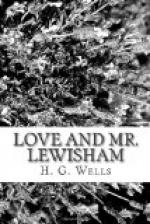The “Kensington thing” was an application for admission to the Normal School of Science at South Kensington, which Lewisham had made in a sanguine moment. There being an inadequate supply of qualified science teachers in England, the Science and Art Department is wont to offer free instruction at its great central school and a guinea a week to select young pedagogues who will bind themselves to teach science after their training is over. Dunkerley had been in the habit of applying for several years, always in vain, and Lewisham had seen no harm in following his example. But then Dunkerley had no green-grey certificates.
So Lewisham spent all that “duty” left him of the next day composing a letter to copy out and send the several scholastic agencies. In this he gave a brief but appreciative sketch of his life, and enlarged upon his discipline and educational methods. At the end was a long and decorative schedule of his certificates and distinctions, beginning with a good-conduct prize at the age of eight. A considerable amount of time was required to recopy this document, but his modesty upheld him. After a careful consideration of the time-table, he set aside the midday hour for “Correspondence.”
He found that his work in mathematics and classics was already some time in arrears, and a “test” he had sent to his correspondence Tutor during those troublous days after the meeting with Bonover in the Avenue, came back blottesquely indorsed: “Below Pass Standard.” This last experience was so unprecedented and annoyed him so much that for a space he contemplated retorting with a sarcastic letter to the tutor. And then came the Easter recess, and he had to go home and tell his mother, with a careful suppression of details, that he was leaving Whortley, “Where you have been getting on so well!” cried his mother.
But that dear old lady had one consolation. She observed he had given up his glasses—he had forgotten to bring them with him—and her secret fear of grave optical troubles—that were being “kept” from her—–was alleviated.
Sometimes he had moods of intense regret for the folly of that walk. One such came after the holidays, when the necessity of revising the dates of the Schema brought before his mind, for the first time quite clearly, the practical issue of this first struggle with all those mysterious and powerful influences the spring-time sets a-stirring. His dream of success and fame had been very real and dear to him, and the realisation of the inevitable postponement of his long anticipated matriculation, the doorway to all the other great things, took him abruptly like an actual physical sensation in his chest.
He sprang up, pen in hand, in the midst of his corrections, and began pacing up and down the room. “What a fool I have been!” he cried. “What a fool I have been!”
He flung the pen on the floor and made a rush at an ill-drawn attempt upon a girl’s face that adorned the end of his room, the visible witness of his slavery. He tore this down and sent the fragments of it scattering....




